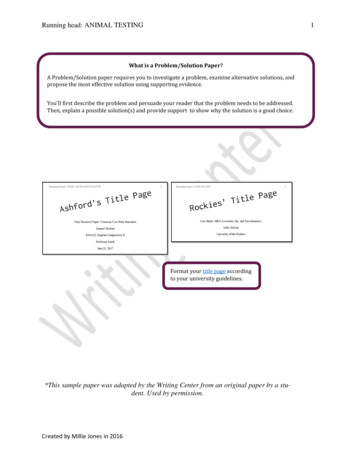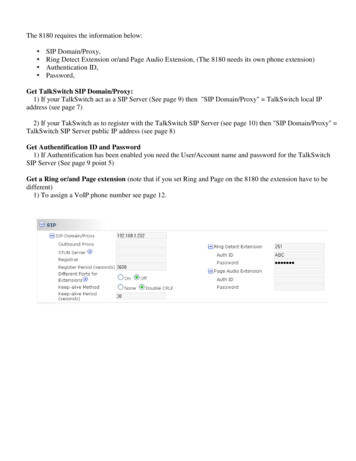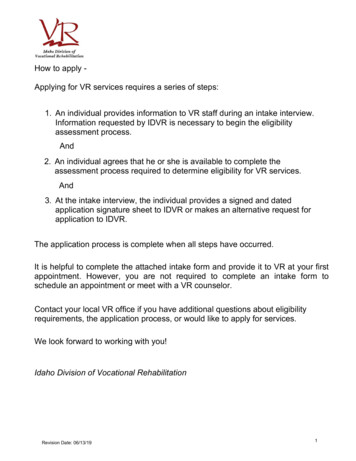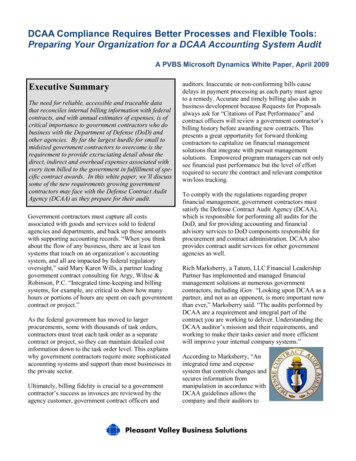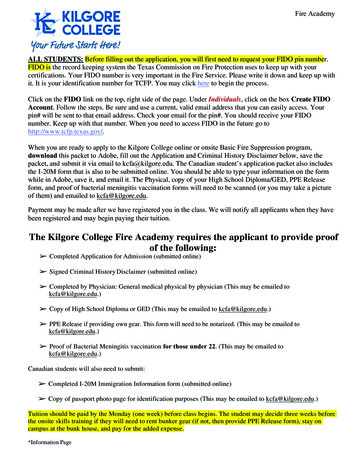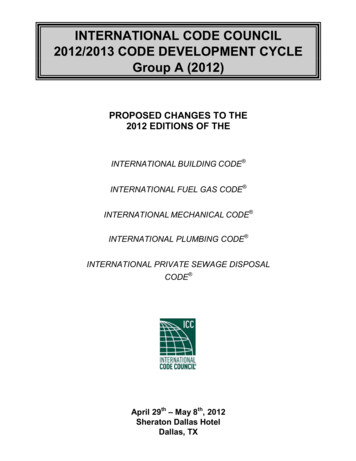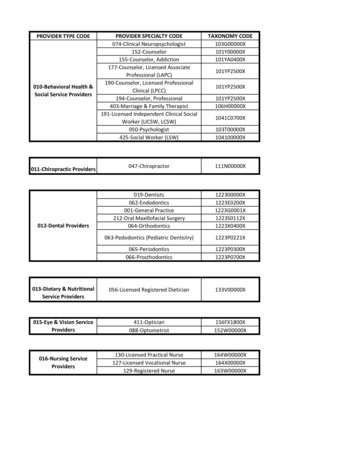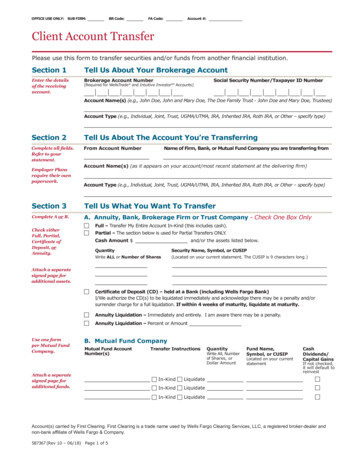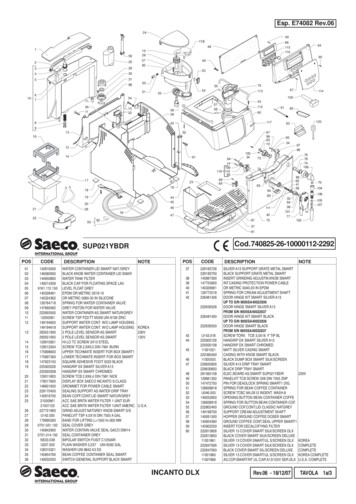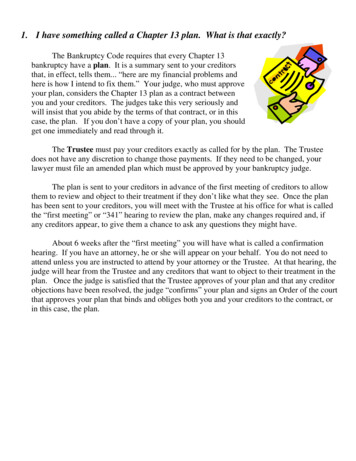
Transcription
1. I have something called a Chapter 13 plan. What is that exactly?The Bankruptcy Code requires that every Chapter 13bankruptcy have a plan. It is a summary sent to your creditorsthat, in effect, tells them. “here are my financial problems andhere is how I intend to fix them.” Your judge, who must approveyour plan, considers the Chapter 13 plan as a contract betweenyou and your creditors. The judges take this very seriously andwill insist that you abide by the terms of that contract, or in thiscase, the plan. If you don’t have a copy of your plan, you shouldget one immediately and read through it.The Trustee must pay your creditors exactly as called for by the plan. The Trusteedoes not have any discretion to change those payments. If they need to be changed, yourlawyer must file an amended plan which must be approved by your bankruptcy judge.The plan is sent to your creditors in advance of the first meeting of creditors to allowthem to review and object to their treatment if they don’t like what they see. Once the planhas been sent to your creditors, you will meet with the Trustee at his office for what is calledthe “first meeting” or “341” hearing to review the plan, make any changes required and, ifany creditors appear, to give them a chance to ask any questions they might have.About 6 weeks after the “first meeting” you will have what is called a confirmationhearing. If you have an attorney, he or she will appear on your behalf. You do not need toattend unless you are instructed to attend by your attorney or the Trustee. At that hearing, thejudge will hear from the Trustee and any creditors that want to object to their treatment in theplan. Once the judge is satisfied that the Trustee approves of your plan and that any creditorobjections have been resolved, the judge “confirms” your plan and signs an Order of the courtthat approves your plan that binds and obliges both you and your creditors to the contract, orin this case, the plan.
2. Who is this Trustee anyway?All Chapter 13 cases have a Trusteewho is responsible for the overalladministration of your case. In all Chapter13 cases in Northern Oregon, the Trustee isWayne Godare and he has approximately5,000 active files in addition to yours.The Trustee's duties are found in theBankruptcy Code. They include, at a minimum,reviewing your bankruptcy petition to ensure that it iscomplete and accurate; determining your ability to makepayments and whether your Chapter 13 plan will besuccessful as proposed; conducting the first meeting ofcreditors and appearing at other hearings in your case;monitoring the progress of your case; collecting your payments and paying creditors accordingto the plan; recovering improper payments made before your filing; providing information aboutyour case to those who are authorized and have a need to know; and most importantly, assistingyou in the performance of your plan.The Trustee’s address is:222 S.W. Columbia Street, Suite 1700Portland, Oregon 97201The Trustee’s office phone is: (503) 972-6300If, for any reason, you change your address while you are in Chapter 13, you MUST notifyBOTH the Trustee’s office and the Bankruptcy Court.REMEMBER: the Trustee cannot give you any legal advice. If you needlegal advice, you need to contact your attorney.The Trustee’s Office Hours Are – 9am to 12 noon - 1pm to 4pm (closed for lunch)
3. I understand I must make a plan payment each month to the Trustee.How do I do that?You must begin making your plan payments to the Trustee within 30 days after your case is filedin the amounts as described in Paragraph 1 of your plan.There are three (3) ways to make your plan payment:(1) Have your payments taken directly from your employee paycheck; or,(2) Use a service called TFS which will draw the payment directly from your checkingaccount and get it to the Trustee (see your attorney or the Trustee’s office for moredetails); or,(3) If you have a valid reason not to use the employee paycheck or TFS, a money order orcashier’s check to the Trustee’s bank in Memphis Tennessee. (We have included in theback of this book a number of address stickers for you to use to insure any payments youmust make yourself reach the bank correctly)REMEMBER, YOU have the obligation to make sure that payments are made directly tothe bank and you need to pay attention to whichever method you choose.The amount of your payment may change, so be sure to check your individual plan so that youare prepared for any payment changes.If you have to make any plan payments directly to the Trustee’s bank, please note the following:THE TRUSTEE'S BANK WILL NOT ACCEPT PERSONAL CHECKSDO NOT MAIL CASH!!If you have to pay directly, the Trustee’s bank can only accept Money Orders orCashiers Checks, which must include:(1) your NAME;(2) your ADDRESS; and(3) your CHAPTER 13 CASE NUMBER (on the front of this book).Please make all direct payments payable to:Wayne Godare, TrusteeAnd mail them to:Wayne Godare, TrusteeP.O. Box 420Memphis, Tennessee 38101-0420The Trustee will never instruct you to make these payments to another address. Ifsomeone directs you to another address, call our office immediately!
4. What happens if I miss payments to the Trustee or creditors for which I amresponsible because of an emergency?You must not miss any payments to the Trustee unless it is permitted by the bankruptcyjudge. When you file your Chapter 13, your creditors are prohibited from taking any actionagainst you. In exchange for that protection, you must complete your obligations under the plan.One of those obligations is making your payments to the Trustee on time. If you wish yourChapter 13 to be successful, you cannot have your employer stop making the payroll deductionsor miss any scheduled payments you are making on your own. If you miss payments, theTrustee cannot pay your creditors as called for by your plan and the Trustee is obligated to filepapers with the Bankruptcy Court asking that your case be dismissed. If your case is dismissed,your creditors will be notified and may resume collection against you.If you have a change in your circumstances such as an unforeseen emergency, you shouldnotify your attorney at once. Your attorney can re-evaluate your financial situation and, ifappropriate, change your plan to reflect the different circumstances. This process can takeseveral weeks, so be sure to contact your attorney immediately if you foresee any problemmaking your payments.REMEMBER: The Trustee does not have the power to excuse any payments.Any change in payments must be approved by your Bankruptcy Judge.IMPORTANT!REGULAR ONGOING MORTGAGE PAYMENTSIf your ongoing monthly mortgage payments are listed in paragraph 7 of your plan and onSchedule J (your budget) you must make those payments as scheduled. If you miss any of thosepayments, you will not have complied with Section 1328 (a) of the Bankruptcy Code and maynot be eligible for a discharge. That section requires that you make all payments under the planbefore a discharge can be granted and ongoing mortgage payments are payments under the plan.DO NOT MISS YOUR ONGOING MORTGAGE PAYMENTS IF YOU WISH A DISCHARGE
5. My plan and confirmation order says I must send copies of my tax returnsand any tax refunds to the Trustee while I’m in Chapter 13. Does the Trusteereally want those?(A) TAX RETURNSThe Judge’s Order approving your Chapter 13 plan says that you must timely file andsubmit signed and dated COPIES of BOTH your STATE and FEDERAL TAX RETURNFORMS to the Trustee every year during your plan whether you get a refund or not. Send yourtax returns and any other documents other than payments to:Wayne Godare, Trustee222 S.W. Columbia Street, Suite 1700Portland, OR 97201DO NOT SEND ORIGINALS! COPIES ONLYPlease send these copies to the Trustee immediately after you file the returns and blank out(redact) any social security numbers and children’s names. The Trustee will check the returnsto see if your gross income has increased and/or if you are entitled to receive a tax refund.REMEMBER: You will not successfully finish your plan unless you completethis requirement!(B) TAX REFUNDSYour Chapter 13 plan requires you to pay your net tax refunds each year to the Trustee. Ifyou receive a tax refund, the entire refund must be sent to the Trustee unless, in that same year,you also owe taxes to a different income taxing authority. For example, if you receive a 500Federal tax refund and that same year you owe the State 300, you would only need to send theTrustee the net of 200. (just endorse the checks over to Wayne Godare or send a money orderor cashier’s check for the net amount and a note showing the math and send it to the Trustee’sbank just like you would send a plan payment) If you receive an adjustment letter from anytaxing authority, be sure to send it to the Trustee so we can adjust our records.You cannot avoid paying your refund to the Trustee by applying your refund to nextyear’s tax obligation, agreeing that your refund can be kept by the IRS for some reason orused as a donation.REMEMBER: You will not successfully finish your plan unless you complete thisrequirement!Tax refunds must be mailed to the Memphis payment address. Be sure to put your case numberall on payments and state that the check is for your tax refunds. If you fail to do this your checkmay not be properly credited.
6. My confirmation order also says that I must report to the Trustee if my actualor projected gross income goes up 10%.could you explain that? And what if Itake money from my retirement fund or get extra money that’s not from my job?The Judge’s Order approving your plan says that you are required to report to theTrustee if and when your gross income increases more than 10% from the amount originallyreported on your Schedule I that was filed with your bankruptcy papers. If that happens, youshould contact your attorney to review all of your income and expenses and file amendedschedules to reflect the changes.You are also required to inform the Trustee if and when you get married during the timeyou are in Chapter 13.The Judge’s Order approving your plan also says that if you or your spouse take aretirement fund distribution or have the right to receive any money exceeding 2500 during yourplan, you must inform your lawyer and the Trustee’s office. It also says that you must keep anyof that money until you either get permission from the Trustee to spend it.Taking a retirement distribution during the plan could turn your otherwise exemptproperty into disposable income. If that happens, the amount of the retirement distribution mayhave to be paid to your creditors before you get your discharge. BE SURE TO TALK TOYOUR ATTORNEY BEFORE YOU ACT.REMEMBER: Everyone in Chapter 13 must paytheir ongoing tax obligations during the life of theplan. This obligation includes any taxes owed as aresult of any increase in income.
7. There are some extra paragraphs attached to the end of my plan. What do I doabout those?Complying timely with the requirements of any additional paragraphs added to your planfor special circumstances is critical to your success in gaining your discharge. Remember: Yourdischarge is the ultimate goal in your Chapter 13. (See number 13 for information about yourdischarge)Some of those commonly used paragraphs are as follows: (If any of these are included inyour plan, be sure to discuss what you need to do with your attorney)A. Overtime, Bonus or Commission Income: In some instances, if you receiveovertime, bonuses or commissions as income, all or a portion of that income may beincome that must be sent to the Trustee. If there is such a requirement, it will beoutlined in a separate paragraph at the end of your plan.B. Future Automobile Purchase: In some instances, you may be planningto purchase an automobile in the near future. You must make thescheduled payments to your attorney until you get permission from theTrustee to make the purchase. See question number 8 for moreinformation.B. Sale of property: Sale of either personal or real property requires specificsteps to be taken to make sure that it is done according to the BankruptcyCode. If this applies to your case, see question number 9 for moreinformation.D. Tax requirements: In all cases, you are required to timely file your required taxreturns and provide a copy to the Trustee’s office. In some cases, that requirement isspecifically set out in an additional paragraph in your plan. Be sure to comply becauseif you don’t your case could get dismissed – sometimes without a hearing.E. Charitable contributions: If you are making charitable contributions fromyour income, you may be required to provide proof to the Trustee. Gettingproof is easy in most instances. If you have this requirement, you need togather the proof each year and send it to the Trustee. If you don’t and can’tprove the contributions, you will need to make up the amount you claimedby paying more to the Trustee before you can get your discharge.
8. May I incur credit during my Chapter 13? What if my car breaks down and Ineed a new one.?The Order signed by the Bankruptcy Judge approving your plan, states that you may notincur any credit obligations during the life of your plan without the Trustee's written consent.The only time you can act without the Trustee's written consent would be:(1) an emergency, or(2) ordinary expenses for a business approved in your plan.Any request for credit must be approved by the Trustee in writing before you obligateyourself in any way. The most common credit obligation you may wish to incur is for thepurchase of a car. Be sure to contact your attorney if you must buy a car or trade in your oldone. Do not let a car dealer talk you into anything before your attorney has had a chance to getinvolved. The Trustee regularly approves requests to finance replacement for basic needsvehicles, so long as you and your attorney follow the proper procedure. That procedure requiresthat you supply the Trustee with some basic information on a form provided by his office andthat you get Trustee approval before you commit to any obligation.REMEMBER: Taking on any new credit obligations could jeopardize your plan and failureto get permission could result in your case being dismissed. AND, not paying your taxobligations as they become due is considered taking on new credit. Be sure to pay whatever taxobligations you have during your plan.
9. My spouse and I have been talking about selling our house and buyinganother while we are in our Chapter 13. Is there anything special we must do?What if I want to have a Home Loan Modification?The Order signed by the Bankruptcy Judgerequires you to inform the Trustee and your creditorsof the sale, lease, encumbrance, disposal orpurchase of any real property or any personalproperty with a value over 10,000. Informingthe Trustee and creditors can be tricky and may haveunexpected consequences if not done properly. It is veryimportant you learn and understand all the possibilitiesbefore you take any steps involving the sale or acquisition of any property. You should contactyour attorney well before you list or advertise your property or purchase property and discusswhat you want to do. The Trustee will require specific information before any permission to buyor sell is given and selling or purchasing property sometimes requires a court order that usuallytakes about 30 days to obtain. Find out what is required BEFORE you commit to any purchaseor sale.If you think you are going to sell or refinance some real property, check out theTrustee’s web site at www.portland13.com and click on “Information forDebtors”, then “Selling or Refinancing Your Home” for more specificinformation about the requirements.Any Home Loan Modification requires the Trustee’s approval. Make sure yourattorney talks to the Trustee’s office before you act.REMEMBER: Selling, buying or improving property is tricky when you are in Chapter 13.Check the website and talk to your attorney first!REMEMBER: You cannot incur any credit obligations while in Chapter 13 without firstobtaining the Trustee’s written consent.
10. How can I find out how my plan is progressing?In January every year, the Trustee will send you and your attorney a complete record of allreceipts and disbursements for the previous calendar year. It will tell you exactly how muchmoney the Trustee has received from you and how much and to whom payments have beenmade.You may also request a progress report if you need one. This request must be in writing andsent to the Trustee's office at the address shown in the answer to question #2. It will takeapproximately a week to 10 days to respond. The progress report will give you a summary ofyour case to date. If you want to know how much it would take to pay off your case, you shouldsend a request for that information to the Trustee’s office in writing. A form for this purpose canbe found on my web site at www.portland13.com by clicking on “Information For Debtors”and then, at the bottom of the page, “Want to Request A Payoff of your bankruptcy case?”REMEMBER: You cannot pay off your case before you have been making plan paymentsfor your required commitment period and have completed all the requirements of paragraph 1 ofyour plan, UNLESS you pay all your creditors 100%. ( See question #11)
11. May I make larger payments to the Trustee and complete my caseearly?The Bankruptcy Code requires you to send all your projected disposable income to theTrustee for your “applicable commitment period” which will be either 36 or 60 months. Yourprojected disposable income is reflected as your payments set out in paragraph 1 of your plan.Your attorney should inform you of your “commitment period” and you can find it by looking atParagraph 7 of your plan. It will be marked either 36 or 60. If your commitment period is 36,you may be required to continue with your payments until all required claims have been paid infull. If your commitment period is 60, you must continue making payments unless .There is, however, one exception to this “applicable commitmentperiod” rule. You may pay off your plan before your “commitmentperiod” if you pay all creditors who have filed claims 100 % of theirclaims.DO NOT ATTEMPT TO PAY OFF YOUR CASE EARLY BYSENDING EXTRA MONEY TO THE TRUSTEE. THE BEST RULEIS TO DO EXACTLY AS YOUR PLAN SAYS. When the Trusteereceives unexpected extra payments, he will wonder where you got the extra money and it won’tshorten your “commitment period”. Any attempt to pay off your plan early can be complicatedand you should check with your attorney before you contact the Trustee.Making larger payments to the Trustee may be required if your income increases (see answerto question # 5). So, if you want to make larger payments because you got a big raise amountingto more than 10% of what you originally reported as your income, you should inform the Trusteeof that fact in writing before you begin sending in more money.REMEMBER: Do not borrow money or incur credit to make bigger payments to theTrustee hoping that you can complete your plan before the end of your “commitment period”.This is not like paying off a car or mortgage. Your best bet is to make your scheduled paymentson time using your disposable income. You filed a Chapter 13 plan to eliminate your debts andget a "fresh start". The best way to accomplish that goal is to follow exactly the terms of yourplan.
12. My attorney said my plan payments would last for at least 36 but might go aslong as 60 months. When should I stop making payments?You or your employer should continue making payments until the Trustee or yourattorney specifically tells you to stop.Depending on whether your income places you below or above Oregon’s median incomelevel, you may be required to make payments to the Trustee for at least 36 months and perhapsas long as 60 months. It can be difficult to predict the exact outcome of your case
Wayne Godare, Trustee And mail them to: Wayne Godare, Trustee P.O. Box 420 Memphis, Tennessee 38101-0420 The Trustee will never instruct you to make these payments to another address. If someone directs you to another address, call our office immediately! 4. What happens if I miss payments to the Trustee or creditors for which I am
